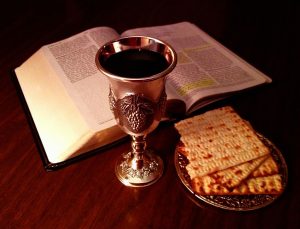 Because of the Watchtower teaching that only the anointed 144,000 are in the new covenant, at their annual Memorial service (their version of communion) only those who profess to be in this special class are allowed to partake of the bread and wine. Others are encouraged to attend, but they are required to pass the bread and wine by. This includes all Jehovah’s Witnesses who are in the great crowd, because the Watchtower says that the new covenant in Christ’s blood is not for them.
Because of the Watchtower teaching that only the anointed 144,000 are in the new covenant, at their annual Memorial service (their version of communion) only those who profess to be in this special class are allowed to partake of the bread and wine. Others are encouraged to attend, but they are required to pass the bread and wine by. This includes all Jehovah’s Witnesses who are in the great crowd, because the Watchtower says that the new covenant in Christ’s blood is not for them.
With regard to this practice, I recommend that you draw the Witnesses’ attention to the following Scriptures. Ask them to read them out loud.
Matthew 26:26-28: “While they were eating, Jesus took bread, gave thanks and broke it, and gave it to his disciples, saying, ‘Take and eat; this is my body.’ Then he took the cup, gave thanks and offered it to them, saying, ‘Drink from it, all of you. This is my blood of the covenant, which is poured out for many for the forgiveness of sins.’” (emphasis added).
Ask, “Didn’t Jesus command all those present to eat and drink? Did he say that some should partake and that some should not?” Most likely they will say that all of the apostles were of the 144,000.
Ask them to read aloud John 6:53-56: “Jesus said to them, ‘I tell you the truth, unless you eat the flesh of the Son of Man and drink his blood, you have no life in you. Whoever eats my flesh and drinks my blood has eternal life, and I will raise him up at the last day. For my flesh is real food and my blood is real drink. Whoever eats my flesh and drinks my blood remains in me, and I in him.’” (emphasis added)
Ask, “Why aren’t you included in whoever?”
Add, “I believe that Jesus is speaking of an inward experience of which partaking of the bread and wine is only a symbol. But when you pass the bread and wine along without partaking, aren’t you testifying that you have never had this inward experience which Jesus said was essential in order to have eternal life?”
If they insist that this experience is only for the 144,000, ask, “What does Jesus say here is true of people who do not eat his flesh and drink his blood?” If they don’t see it, keep pressing until they say that such people have no life in themselves.
Ask, “Doesn’t this mean that you have no life in yourselves?” They may mention that Paul said people should not partake in an unworthy manner (1 Corinthians 11:27). If they do, point out that the context has nothing to do with two classes. The problem was that they were dividing the congregation. Some people drank to excess, while others didn’t get to partake and went hungry. All were supposed to partake.
Ask them to read aloud 1 Corinthians 10:16-17: “Is not the cup of thanksgiving for which we give thanks a participation in the blood of Christ? And is not the bread that we break a participation in the body of Christ? Because there is one loaf, we, who are many, are one body, for we all partake of the one loaf” (emphasis added).
Ask, “According to this passage, how many bodies are there? One or two? How many of them does Paul say were partaking of the bread? Why aren’t you included in all?”
Your turn:
Have you ever discussed the New Covenant with a Jehovah’s Witness? Do you think my suggestions might be helpful?
Share your thoughts in the comments.
(Photo by John Snyder (Own work) [CC BY-SA 3.0 (https://creativecommons.org/licenses/by-sa/3.0)], via Wikimedia Commons)

Leave a Reply
Be the First to Comment!